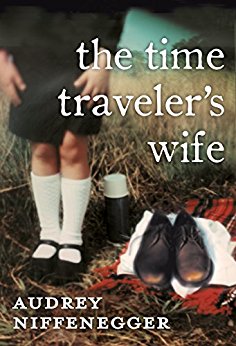
It all started with The Time Traveler’s Wife back in 2003. A book about Henry, a man who time travels arbitrarily, and his wife who has to deal with it, to tragic ends. But what readers missed was that Claire the protagonist was not really the eponymous hero. Audrey Niffenegger took her title from J.B. Priestley’s book, Man and Time, in which he refers to our “inner time” as our “wife.” Of course, it’s a wonderful play on words. The book deals with the fact that Claire is tied to this horrible fate forever, and at times detests her lot in life being so in love with Henry. But she drinks, dances, has lovers. She has a brilliant career. She’s a nerd. There’s no flies on Claire.
But then came the barrage of daughter/wife/mother titles, hollowed out. The Hangman’s Daughter by Oliver Pötzsch was the next one that made it big. Not so bad, given it’s a small child and not actually a woman. But consider, The Garment Maker’s Daughter by Hillary Stern. The Sea Keeper’s Daughter by Lisa Wingate. The Mapmaker’s Daughter by Katherine Nouri Hughes. The Clockmaker’s Daughter by Kate Morton. The Innkeeper’s Daughter by Michelle Griep. The Shipbuilder’s Wife by Jennifer Moore. The Aviator’s Wife by Melanie Benjamin. The Gamekeeper’s Wife by Clare Flynn. I could go on… and on. Just look at Amazon.
I am sure the authors expect us to see this as others in the book’s universe do. “Oh, it’s the [insert profession here]’s daughter/wife.” No doubt these women rise up to either marry someone unexpected, or to commit some kind of feat unexpected of their station. But wouldn’t it be refreshing if the book titles didn’t suggest it’s OK to just be a women, someone else’s ” ‘s” possession? It’s still not right. In nearly all these books, the protagonist is also working the same trade as their father, or have their own life away from their husband, or there is something interesting about them. The Blind Seamstress or The Lullaby Singer, for instance, might be just as catchy. But instead, books with strong female protagonists tend to favor the object of the book, The Hunger Games, vbΩA Wrinkle in Time, Big Little Lies.
Can you imagine a book called The Doctor’s Husband? Surely this is a gay book, would be your first reaction, because you are still assuming the doctor is male. Or let’s say, The President’s Husband. Would you assume the gender? Maybe, The Preacher’s Son — would you assume the preacher is male? Even if we do get a nod to the protagonist being something more than an appendage, women are often referred to as “girls”, as if women are flighty children with issues, such as The Girl With The Dragon Tattoo (a single woman in her late 20s who holds down a high-paying international tech job, er, with a tattoo), Gone Girl (A married woman in her 30s who has a Post Grad from Harvard and a brilliant brain), Girl, Interrupted (a young woman fighting against vnher mental illness to triumph as a writer).
While publishers still believe that there are authors (to mean men) and there are female authors (and then don’t forget “black female authors,” “gay female authors” etc. despite the fact we have gay male writers all the time, e.g. Palahniuk, Easton Ellis, openly gay, never compromised on their profession being anything but “writer” or “author”). We have a fight on our hands with the idea of a trade being owned by women just as often as a man. These books may be cashing in on Niffenegger’s brilliant play on words, but they are presenting a very strange ideal in the way of book heroes we can cheer for.
Get an Editorial Review | Get Amazon Sales & Reviews | Get Edited | Get Beta Readers | Enter the SPR Book Awards | Other Marketing Services






















Leave A Comment